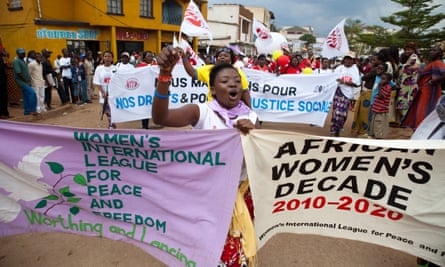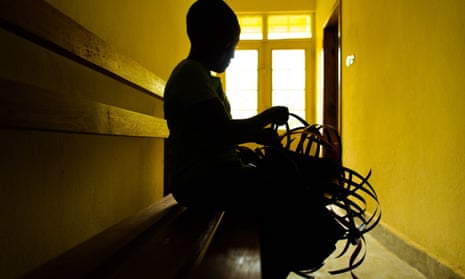Greater support and training is needed at national level to increase the chances of prosecuting crimes of sexual violence in conflict, according to new research from the University of California, Berkeley, School of Law.
Efforts to prosecute perpetrators of sexual violence during conflict are being undermined by the inability of local investigators and prosecutors to support victims, collect evidence and protect witnesses, said a report entitled The Long Road: Accountability for Sexual Violence in Conflict and Post-Conflict Settings (pdf), launched on Wednesday by Berkeley’s Human Rights Center’s sexual violence programme.
“There is so much focus on what the international criminal court (ICC) is or is not doing about sexual violence committed as a war crime, crime against humanity, or act of genocide,” said Kim Thuy Seelinger, director of the sexual violence programme. “But it’s the nurse at the county clinic or the rural police officer who can actually play a central role in the pursuit of justice, even when the crime violates international law.”
Between 2011 and 2014, researchers looked at the challenges of reporting, investigating and prosecuting sexual violence cases in Kenya, Uganda, Liberia and Sierra Leone, all countries that have experienced conflict in recent years. Each of the countries had some legislation covering sexual violence.
Researchers found that the stigma that still surrounds sexual violence, coupled with the lack of satisfactory support available to survivors, means some people will opt to resolve conflict within communities rather than through the legal system. Fear of reprisals, particularly if the perpetrator is a family member, is another barrier to reporting crime. Researchers also found that some people neither know sexual violence is a crime nor know how to report it. The failure of healthcare and police services to collect and investigate evidence of sexual violence adequately, particularly during times of conflict, in turn hinders prosecution.
The report said local healthcare workers, legal teams and the judiciary bear the greatest responsibility for responding to reports of violence and need to be well trained and sensitised to deal with domestic and international crimes, which comprise war crimes, crimes against humanity, or acts of genocide as defined by the Rome statute of the ICC (pdf).
Among a series of recommendations, researchers are calling on legislators to fully integrate the Rome statute into national laws and operations – Kenya and Uganda have made attempts to do so – and establish legal aid and witness protection programmes to support prosecutions. Justice ministries should improve court practice, allowing survivors to give testimony in camera, ensuring anonymity and seeking out appropriate venues where international crimes can be heard.
Healthcare workers need to be trained in how to support survivors of sexual violence, and be better prepared to give court testimony, while police forces should receive clear guidance on how to investigate sexual violence crimes sensitively and enough funding to implement it.
“A state can’t pass a shiny new law against sexual violence but then not provide the tools or resources for meaningful implementation,” said Seelinger, speaking from Kampala, where the Human Rights Center is hosting a workshop consisting of more than 70 legal, health, and law enforcement leaders from six African countries to discuss practical ways to improve access to justice and support survivors.
“If a nurse doesn’t have the right post-rape examination supplies, or if a police officer doesn’t have enough fuel to ride out to a crime scene, then they can’t do their jobs. Survivors won’t receive the support or justice they are entitled to. The most basic systems still require material and human resources to function properly.”
Seelinger emphasised the need for better collaboration and coordination among all the sectors responsible for reporting and prosecuting crimes. “A vaginal swab taken in a post-rape care exam needs to be stored properly until it is picked up by the police, who may need to bring it to a lab for analysis, and then it needs to be stored for prosecution and trial.
“Even if every nurse and police officer and analyst and prosecutor is doing a decent job, a survivor or a piece of evidence can still fall through the cracks between them if they are not well coordinated and working off the same operating procedures. Also, coordination of cross-sectoral actors is so important when making sure that a survivor has everything he or she needs – medical care, psychosocial support, shelter, access to legal aid.”
Seelinger said sexual violence is incredibly complex and multi-faceted, and requires an equally complex and multi-faceted response.”

Preventing and ending sexual violence in conflict has been slowly rising up the international agenda recently. Last year, the UK government hosted a global summit in London and launched an international protocol on investigating and documenting sexual violence crimes.
Seelinger said the protocol is “an admirable effort to take an incredibly complex issue and break it down into practical steps”. But, at more than 100 pages and with very technical language, she said it was not the most user-friendly document for police officers in the four countries studied.
Ultimately, said Seelinger, ending impunity will only be possible if sexual violence is treated as a serious crime. “This means having clear criminal laws, adequate investigation resources, victim support and witness protection measures, and putting it squarely on the curriculum at police academy.”
